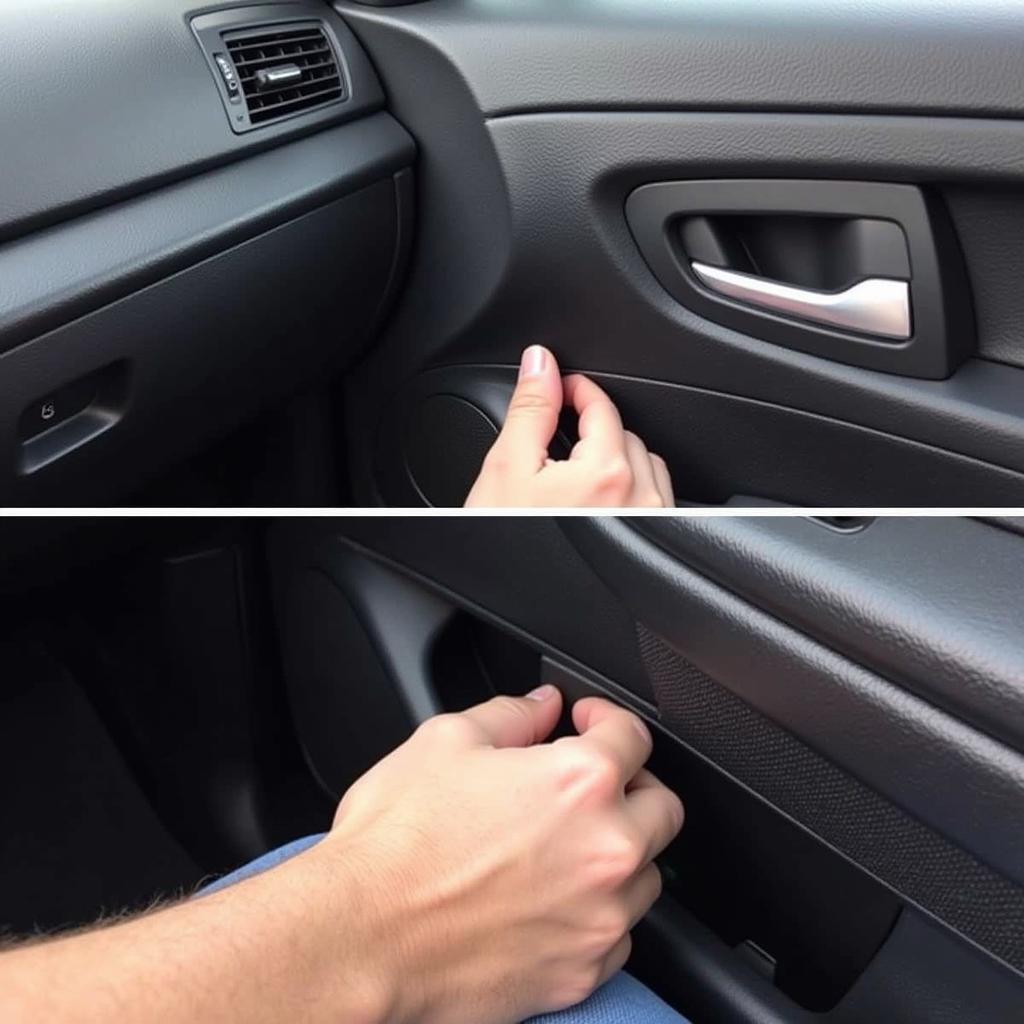Experiencing a rattling, buzzing, or vibrating sound coming from your car speakers can quickly turn your favorite tunes into an irritating distraction. This issue is more common than you might think and can stem from various sources. Thankfully, fixing a vibrating car speaker isn’t always a job for a professional mechanic. With a bit of know-how and some elbow grease, you can often diagnose and resolve the problem yourself.
This comprehensive guide will delve into the common causes of car speaker vibration, provide step-by-step troubleshooting tips, and offer practical solutions to help you get your car audio system back to delivering crystal-clear sound.
Common Causes of Vibrating Car Speakers
Before diving into the solutions, it’s crucial to understand the root causes of the problem. Here are the most common culprits behind vibrating car speakers:
1. Loose or Damaged Speaker Components: Over time, the screws securing your speakers, the speaker grille, or even the speaker cone itself can become loose. This looseness allows for excessive movement and vibration, especially at higher volumes. Additionally, a torn or damaged speaker cone can also produce a distorted, buzzing sound.
2. Worn-Out Speaker Surround: The speaker surround is the flexible ring that connects the speaker cone to the speaker basket. This component is prone to wear and tear with age and exposure to extreme temperatures. A deteriorated surround can’t hold the cone firmly, resulting in vibrations and muffled sound.
3. Damaged or Worn-Out Door Panel: Your car door panels act as a soundboard for the speakers. If the panel is loose, rattling, or has deteriorated mounting points, it can amplify speaker vibrations and create unwanted noise.
4. Poor Wiring or Connections: Loose or corroded wiring connections within the speaker system can disrupt the electrical signal flow, leading to distortion and vibrations, especially at higher volumes.
5. Amplifier Issues: If you’re running an aftermarket amplifier, it might be sending a distorted signal to your speakers. This distortion can cause the speakers to vibrate excessively, particularly at higher volumes.
Troubleshooting Vibrating Car Speakers
Now that you have a good understanding of the potential causes, let’s explore how to troubleshoot the issue:
1. Isolate the Problem: Start by determining if the vibration is coming from a specific speaker or all of them. This will help narrow down the source of the problem.
2. Inspect the Speaker: Carefully examine the speaker cone for any visible tears, rips, or damage. Gently press the cone inwards to check for any scraping or rubbing sounds. Also, check if the speaker grille is securely attached.
3. Check the Speaker Surround: Examine the speaker surround for any signs of cracks, tears, or deterioration. A worn-out surround will feel brittle or sticky.
4. Examine the Door Panel: Press firmly around the door panel, especially near the speaker, to see if there are any loose parts or rattling noises. Inspect the mounting points for any signs of damage or wear.
5. Check the Wiring and Connections: Carefully inspect the wiring connected to the speaker for any loose connections, corrosion, or damage. Make sure the wires are securely fastened to the speaker terminals.
 Inspecting Car Door Panel for Vibrations
Inspecting Car Door Panel for Vibrations
How to Fix a Vibrating Car Speaker: Step-by-Step Solutions
Once you’ve identified the root cause of your speaker vibration, you can move on to implementing the appropriate fix:
1. Tighten Loose Screws: If you find any loose screws on the speaker, speaker grille, or door panel, carefully tighten them using a screwdriver. Ensure you don’t overtighten them, as this can damage the components.
2. Repair or Replace Damaged Components: If you discover a torn speaker cone, a damaged surround, or a worn-out door panel, you’ll need to repair or replace the affected part. You can purchase replacement parts online or from an auto parts store.
3. Fix Wiring Issues: If you find any loose, corroded, or damaged wiring, you’ll need to repair or replace the affected sections. Use electrical tape or heat shrink tubing to insulate exposed wires and ensure all connections are secure.
4. Address Amplifier Distortion: If you suspect the amplifier is the source of the distortion, try adjusting the gain settings or consult a car audio professional for assistance.
5. Apply Sound Dampening Materials: To further reduce vibrations and improve sound quality, consider applying sound dampening materials to your car doors. These materials absorb vibrations and minimize unwanted resonance.
Expert Insights
“Many car owners underestimate the impact of loose components on their audio system,” says John Smith, a seasoned automotive electrician with over 20 years of experience. “A simple screw check can often resolve those annoying vibrations and restore the clarity of your music.”
“Don’t overlook the importance of using high-quality replacement parts,” Smith adds. “Investing in durable speakers and components can significantly extend the lifespan of your car audio system and ensure optimal performance.”
Conclusion
A vibrating car speaker can be a frustrating experience, but it doesn’t have to mean a trip to the mechanic. By following the troubleshooting tips and solutions outlined in this guide, you can often identify and fix the issue yourself, saving both time and money. Remember to approach the process with patience and attention to detail.
If you’re uncomfortable tackling the repair yourself or if the problem persists, don’t hesitate to seek professional assistance. For expert advice and top-notch car repair services, contact AutoTipPro at +1 (641) 206-8880 or visit our office at 500 N St Mary’s St, San Antonio, TX 78205, United States. We’re here to help you enjoy a smooth and enjoyable ride with a crystal-clear sound system.




Leave a Reply